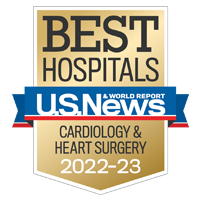
Ventricular Fibrillation
Ventricular fibrillation is a condition in which the heart's electrical activity becomes disordered. When this happens, the heart's ventricles, the lower chambers that pump blood, contract in a rapid, unsynchronized way. The ventricles "flutter" rather than beat, causing the heart to pump little or no blood. Ventricular fibrillation is life-threatening and requires prompt treatment. Collapse and sudden cardiac death will follow in minutes unless medical help is provided immediately. If treated in time, ventricular fibrillation can be converted into a normal rhythm by shocking the heart with a device called a defibrillator.
An effective way to correct life-threatening rhythms is by using an electronic device called an implantable cardioverter defibrillator, which shocks the heart to normalize the heartbeat if the heart's own electrical signals become disordered.
Our Approach to Ventricular Fibrillation
Over the past decades, UCSF has helped pioneer breakthroughs in the understanding and treatment of arrhythmias, or heart rhythm disorders, such as ventricular fibrillation. We offer comprehensive evaluations to pinpoint the source of the arrhythmia, as well as the most innovative treatments available to restore the heart's normal rhythm.
Treatments to prevent ventricular fibrillation include medications and implantable cardioverter defibrillators (ICDs), devices that can detect abnormal heartbeats and deliver an electrical shock to reset the heart's normal rhythm. UCSF participated in the clinical trials that led to the FDA's approval of ICDs, and we offer expert care before, during and after insertion of the ICD.
While providing specialized, tailored care is our primary focus, we are also dedicated to finding new treatments through research. Patients who choose to participate in clinical trials may have access to experimental therapies, devices or medications that might work better for them than the established options.
Awards & recognition
-

Among the top hospitals in the nation
-

One of the nation’s best in cardiology & heart surgery
UCSF Health medical specialists have reviewed this information. It is for educational purposes only and is not intended to replace the advice of your doctor or other health care provider. We encourage you to discuss any questions or concerns you may have with your provider.





